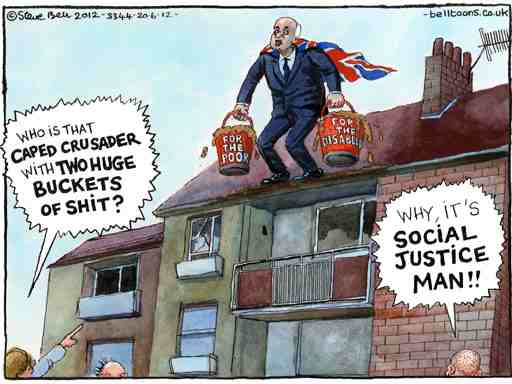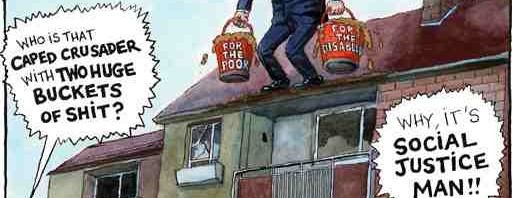
"My understanding is that to divert blame away from his policy failures he directed it at the poor themselves. Financial punishments for the "workshy", by reducing or abolishing their benefits, contributed to the huge cuts he had to make" ~ Bob Holman
By Bob Holman
Iain Duncan Smith’s concern over poverty started in 2002 when, as leader of the Conservative party, he visited Easterhouse in Glasgow. It is fully recorded that he was shocked by its social conditions. Less well known is that he responded to poor people in a positive manner. At Family Action in Rogerfield and Easterhouse (Fare), a locally run project I had helped to set up, he was impressed by the contribution of volunteers who were unemployed and single parents. He met families on low incomes who coped well with their children. He praised individuals who leapt at the chance to work for Fare. I thought him a decent man.
Eight years later he became work and pensions secretary. His objective was a universal credit to lift all out of poverty. Yet within two years he was claiming that poverty was not directly due to a lack of money but was the result of bad parenting, drug and alcohol addiction, laziness, and the break-up of families. These factors should be the new measures of poverty, he announced last week, because they lead to citizens who waste money and become dependent on public handouts.
Why did this U-turn happen?
He was instructed by the chancellor to make mounting cuts. Clearly, Duncan Smith’s main welfare objective was not possible. When I went to Westminster last year to challenge him, he acknowledged that he was under pressure and had to make trade-offs and compromises. My understanding is that to divert blame away from his policy failures he directed it at the poor themselves. Financial punishments for the “workshy”, by reducing or abolishing their benefits, contributed to the huge cuts he had to make.
Duncan Smith’s analysis is wrong. The majority of poor people are in work, not on benefits. Rises in unemployment are due to the recession, not laziness and addictions. Having lived in deprived areas for a quarter of a century, I know that most workless people are not workshy. Typical is a young friend who tramped around shops until he got an interview. As for families, I know of those cutting down on essentials to pay for their children to go on a camp with our project.
Duncan Smith is paradox personified. He wept at the plight of the poor yet now hands out punishments that must bring tears to their eyes. In 2005, at a fringe meeting at the Labour party conference, he called on Labour to promote a definition of lowest income that would allow all to have “sufficient resources to participate in the life of the community”. Now, the poorest families are in receipt of food parcels.
So, what should Duncan Smith’s next move be? He should resign and become a campaigner for the end of poverty. As a Conservative, he would reach a different audience from those of us who preach to the converted. He should set up an independent commission to assess how much family income is required to enable everyone to be included in mainstream society. Then, he should decide how this could be achieved by redistribution from the top to the bottom – greater equality undermines the very evils Duncan Smith thinks lead to poverty. This would be the most constructive Tory U-turn of all.
• Bob Holman is a community worker and co-founder of the Fare project in Glasgow
guardian.co.uk © Guardian News & Media Limited 2010
Published via the Guardian News Feed plugin for WordPress.


3 Responses
Tragically whatever IDS once was, he is now so blinded by his own ideological desire to blame that he can no longer see the wood for the trees. If what is said here is true, and i do believe it is, then IDS is a man in need of immediate help, as i would say his continuing words and deeds suggest he is on the verge of a nervous breakdown.
This would be a Road to Damascus Conversion for the ” Secretary of State for Work
and Pensions ” to become a Campaigner for the Poor
We do Need a Better Settlement to Protect the Poor and Vulnerable
It is Truly in the National Interest and of the Interest of the Quality of Life that
the UK has a Political and Economic Revolution to Break the Stranglehold of
Capitalism and Get this Millionaire Regime Out of Office